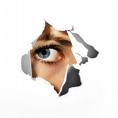Welcome!

This blog is about software that protect your privacy. "History Erasers" is a substitute phrase used to refer to "Privacy Software." Privacy Software is defined by Wikipedia as "..software built to protect the privacy of its users. The software typically works in conjunction with Internet usage to control or limit the amount of information made available to third-parties. The software can apply encryption or filtering of various kinds..."
The most disconcerting fact about online privacy is that there are at present, no laws, legal sanctions, legislative acts or government agencies anywhere in the world that protect an individual's online privacy in the same way as one's material assets such as land, houses or cash are protected. Privacy protection is simply do-it-yourself and most information about it is disseminated through hearsay or even popular half-truths. It is therefore very important to find the right sources of information and the most reliable software and technologies that protect our online privacy.
There is no better place to get the right information than from user reviews by experts who have tested top-notch privacy software and shared their insights based on firsthand experience with the software. Internet eraser software is reviewed by consumers daily and you should take advantage of reading them before you pay for a history eraser.
History Erasers and anti-virus software are two different things. The technology used to steal information from you cannot be countered even by the best anti-virus software. In fact a lot of files that are usually referred to as spyware, spam or adware passes through anti-virus software as harmless files. These files are simply not meant to destroy or corrupt your system that is why they are not considered viruses. So the best way to prevent privacy invasion is to thoroughly and properly dispose of the useless files in your computer that could only compromise your identity and your security.


